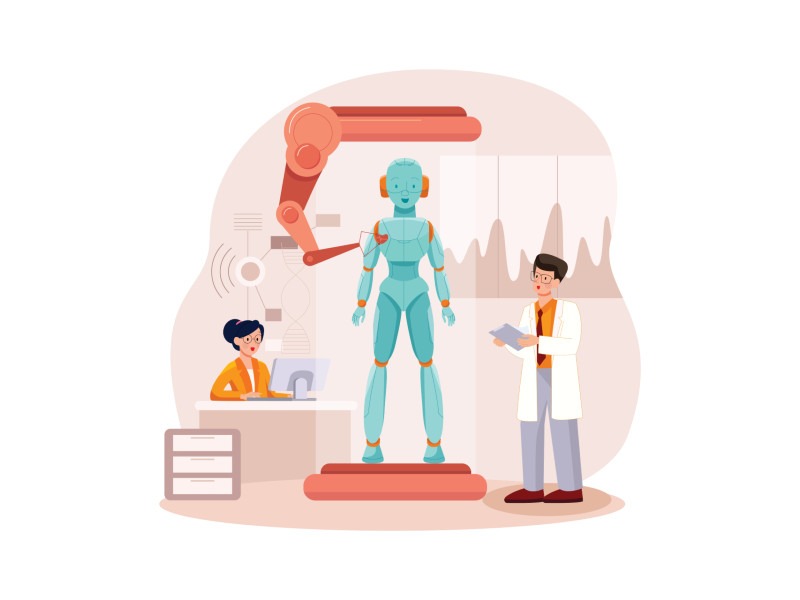Introduction
Artificial Intelligence (AI) is no longer a buzzword in sci-fi circles; it has evolved into a disruptive force in various sectors. One such area where AI’s impact is profound yet contentious is defense and security. This is a domain where technology has always played a crucial role. AI, with its ability to learn, adapt, and make decisions, promises to redefine the way defense operations are conducted, significantly impacting national security.
However, as with any technology, AI’s role in defense and security also raises some crucial questions. These include concerns about the moral and ethical implications of AI in warfare, surveillance, and national security. Through this critical review, we will explore how AI is revolutionizing defense and security, while addressing the challenges it presents.
From autonomous vehicles to surveillance systems, AI is increasingly embedded in defense strategies, radically transforming military operations and reshaping the future of national security. As we navigate this era of accelerated digital transformation, understanding the potential and implications of AI in defense and security is crucial.
Step into the fascinating world of the present, where artificial intelligence (AI) is not a distant dream, but a thrilling reality. Experience the seamless integration of AI in your everyday gadgets – your smartwatch, the intuitive smart speaker, the diligent security alarm, or the customer service chat box – all are manifestations of the awe-inspiring AI technology. Curious about the behind-the-scenes of AI creation? Pondering if AI is actually real? The enlightening ‘Artificial Intelligence For Dummies’ has all the answers you seek.
Commencing with a fundamental understanding of AI, this reference demystifies the intricate topic of AI for you. From the usage of data, algorithms, to the specialized hardware, the book is an easy-to-understand guide to the universe of AI that breathes life into the devices you simply can’t do without.
Here’s what the book promises to offer:
- Debunk the hyperbole surrounding artificial intelligence and get a true picture
- Delve into the astonishing capabilities of AI and learn about its boundaries
- Learn how AI accelerates data collection and analysis, enabling faster, informed decisions
- Explore how AI breathes life into hardware applications such as drones, robots, and vehicles
- Discover the potential applications of AI in diverse fields like space, medicine, and communication that are on the horizon
It’s worth noting that nearly 80% of the devices you interact with on a daily basis rely on some form of AI. While you don’t need to understand AI to use your smart speaker or engage with a bot, possessing knowledge about its inner workings will undoubtedly make you feel smarter. So, why wait? Grab this accessible guide today and unravel the captivating secrets of AI!
Artificial Intelligence in Defense and Security
AI’s role in defense and security cannot be understated. Its capabilities extend beyond enhancing operations efficiency. AI algorithms can process vast amounts of data at unprecedented speeds, make predictive analyses, and carry out tasks in hazardous environments, making it a vital tool in the defense sector.
The United States Department of Defense (DoD) has been a front-runner in leveraging AI technologies, establishing the Joint Artificial Intelligence Center (JAIC) to accelerate the delivery of AI capabilities and adapt AI tools across the DoD. This is just one example of how AI is being embraced for defense and security (source).
Defining the Role of Artificial Intelligence in Defense
In the defense sector, AI plays a critical role in decision-making, battlefield operations, logistics, and surveillance. AI-based systems can analyze large volumes of data, spot patterns, and generate actionable insights. This allows for faster, more accurate decisions, which is vital in time-sensitive military operations.
For instance, Project Maven, a Pentagon initiative, leverages AI to analyze drone footage and provide valuable insights to military personnel. By automating the analysis of video data, AI helps streamline the decision-making process, allowing military personnel to focus on strategic tasks (source).
Which of the following industries commonly requires data entry tasks?
How Artificial Intelligence is Revolutionizing Military Operations
AI has the potential to revolutionize military operations, enabling new levels of effectiveness and efficiency. From autonomous vehicles and drones to advanced surveillance systems and predictive maintenance, AI’s applications in military operations are broad and transformative.
AI-powered autonomous vehicles and drones can carry out a variety of tasks, such as reconnaissance, supply delivery, and even combat operations. By reducing the need for human intervention, these AI systems can perform tasks that are too dangerous for humans, enhancing operational safety and efficiency.
Furthermore, AI can help improve maintenance processes in the military. Predictive maintenance algorithms can analyze data from equipment to predict failures before they occur, reducing downtime and improving operational readiness. Companies like Uptake provide AI-based predictive maintenance solutions that have been used by the U.S. Army to improve readiness of its Bradley Fighting Vehicles (source).
Discover the vibrant world of e-Commerce, where endless possibilities and captivating experiences await at the click of a button, revolutionizing the way you shop, connect, and thrive online.
The Impact of Artificial Intelligence on National Security
AI’s impact on national security is multifold. It enhances threat detection, improves decision-making, and aids in the prediction and prevention of security incidents. However, it also presents new challenges and vulnerabilities that need to be addressed.
AI algorithms can analyze vast amounts of data to detect anomalies and potential threats that traditional methods might miss. By doing so, AI can aid in the early detection of cyberattacks, espionage activities, or other threats to national security. An example is the use of AI by the National Security Agency (NSA) in the US, which leverages machine learning to identify cyber threats (source).
AI’s predictive capabilities can also help prevent security incidents. For instance, AI can analyze social media activity, communications, or other digital footprints to identify potential security threats. This information can be used to take preventative measures and disrupt potential threats before they materialize.
While AI offers significant advantages in terms of threat detection and prevention, it also presents new challenges and vulnerabilities. AI systems can be exploited or manipulated by malicious actors, leading to potential security risks. For example, adversarial attacks, where AI models are fooled by carefully crafted inputs, can compromise the reliability of AI systems in defense. Therefore, securing AI systems is a critical aspect of leveraging AI for national security.
Artificial Intelligence in Surveillance: A New Era of Security
AI has significantly improved surveillance capabilities, leading to a new era of security. AI-powered surveillance systems can analyze video footage in real-time, identify anomalies, and trigger alerts. This increases the efficiency of surveillance operations and aids in the early detection of potential security threats.
China is known for its extensive use of AI in surveillance. The country’s vast network of CCTV cameras is backed by facial recognition technology, enabling real-time tracking and identification. This has been used for various purposes, from finding missing persons to catching criminals (source).
However, the use of AI in surveillance also raises significant concerns about privacy and civil liberties. While these technologies can enhance security, they can also be used for mass surveillance, leading to potential misuse and abuse. This is a topic of ongoing debate, highlighting the need for regulations and safeguards to balance security needs with privacy rights.
AI-powered surveillance technologies also pose a risk of bias. AI models are only as good as the data they are trained on, and if the data is biased, the AI’s output will also be biased. This can lead to unjust outcomes in surveillance, making fairness and transparency crucial considerations in the development and deployment of AI in surveillance.
Artificial Intelligence and the Future of Defense Strategies
Looking ahead, AI is set to play an even more significant role in defense strategies. AI technologies are advancing at a rapid pace, and their potential applications in defense are vast. However, the adoption of AI in defense also needs to be balanced with considerations about ethics, security, and regulation.
Emerging AI technologies, such as swarming, where multiple drones operate as a coordinated group, could redefine warfare and defense strategies. Similarly, AI advancements in cyber defense will be crucial in protecting against the increasing threat of cyber warfare.
At the same time, the use of AI in defense presents ethical dilemmas. The development of autonomous weapons, or “killer robots”, has sparked a global debate about the moral and legal implications of AI in warfare. As AI becomes more integrated into defense strategies, these ethical considerations will need to be addressed.
AI also presents new security vulnerabilities. As defense systems become more reliant on AI, they also become more vulnerable to cyberattacks and AI-specific attacks, such as adversarial attacks. Ensuring the security of AI systems will be a critical challenge in the use of AI in defense.
In conclusion, AI is set to play a pivotal role in reshaping defense and security. Its potential to enhance efficiency, decision-making, and operational safety makes it a
Conclusion
powerful tool in the defense sector. However, the adoption of AI also presents new challenges and vulnerabilities that need to be addressed. As we move towards a future where AI is deeply ingrained in defense strategies, it is crucial to balance the benefits of AI with considerations about ethics, security, and regulation.
The impact of AI on defense and security goes beyond improved efficiency and effectiveness. AI has the potential to fundamentally transform the nature of warfare and national security, presenting both opportunities and challenges. As AI continues to advance, so too will its role in defense and security. Therefore, understanding, adapting to, and responsibly managing this transformation will be key to ensuring national security in the digital age.
Finally, the use of AI in defense and security underscores the importance of regulations and safeguards. While AI can significantly enhance defense capabilities, it also raises important ethical and security issues. It is therefore vital to establish regulations and safeguards that balance the need for enhanced defense capabilities with considerations about ethics, security, and privacy.
The integration of AI into defense and security is not without its challenges. However, by addressing these challenges and harnessing the power of AI, we can redefine defense strategies, enhance national security, and navigate the complexities of the digital age.

AI: A Green Revolution in the Agricultural Landscape
Artificial Intelligence is fueling a new Green Revolution, transforming agriculture with precision farming, sustainable practices, and smarter pest control. Discover how AI is shaping the future of farming, creating a sustainable, efficient, and productive agricultural landscape



